Veterans offered narrowboat life switch by charity
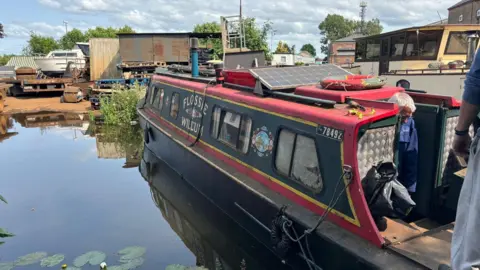 Forces Veterans Afloat
Forces Veterans Afloat"I actually feel human again for the first time in eight years."
Jay Saunders, a veteran who left the armed forces due to complex post-traumatic stress disorder, says a new charity has "revolutionised" his prospects.
Forces Veterans Afloat (FVA) provides former service personnel with a recovery environment quite unlike a hospital or clinic - it gives them a narrowboat.
Lizzie Lane, from the charity, said: "If you want a bit of peace and quiet, you just take your mooring pins up and go half a mile down the canal where there isn't anybody."
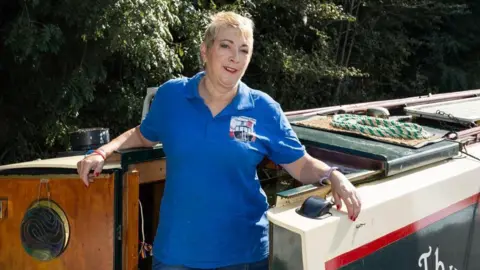 Lizzie Lane
Lizzie LaneMs Lane, 62, said buying a narrowboat revealed a hidden side to society.
"It shocked me when I was going round the canals and rivers just how many veterans were camping on the banks," she said.
"They are attracted to the peace and quiet, to that fundamental need to be by water.
"But here I was, with my boat and a home to go back to, and these people who had fought for their country, did not even have a roof over their heads."
The group started four years ago but was only granted charity status last year.
It now has nine boats, with two more promised.
While it has been given free or reduced cost access to boatyards at Sawley in Derbyshire and Gunthorpe Marina in Nottinghamshire, the charity is aiming to built a bespoke facility in Erewash, Derbyshire.
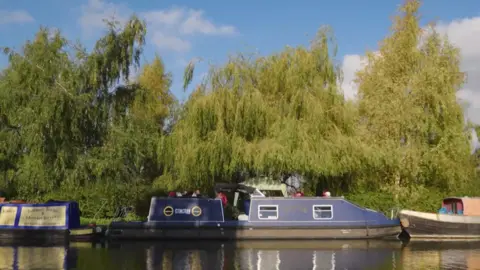 Forces Veterans Afloat
Forces Veterans AfloatMs Lane said: "They tend to appeal to veterans because when you have been in the forces you spend a lot of your time moving around from posting to posting, you're not used to being in one place for any length of time, maybe even living under canvas.
"And it can be really difficult to settle in bricks and mortar in one place.
"So being in a narrowboat is a bit like being a snail - you can take your home with you.
"So if you want to go to a different part of the country, or something is triggering PTSD you can move away from that.
"If you want to be near people, you can be part of that boating community and move near people.
"Or alternatively, if you want a bit of peace and quiet, you just take your mooring pins up and go half a mile down the canal where there isn't anybody."
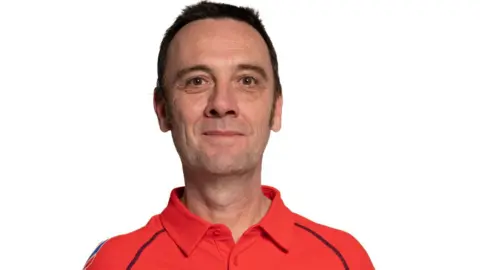 Jay Saunders
Jay SaundersFVA works with forces' charities to find suitable tenants and currently has "four or five" people a month applying.
"We will never have enough boats for the people who want them," said Ms Lane.
Jay Saunders, 56, was given a medical discharge after combating Ebola in Sierra Leone left him with complex PTSD.
After struggling with conventional accommodation he stumbled across FVA and was allocated the vessel Stingray eight months ago.
"It has revolutionised my recovery and my quality of life," he said.
"The world wants you to run at 300mph but when I am moving the boat at 4mph, my brains slows down to the same speed and I can start to gain control of my brain whereas my PTSD makes me lose control of it.
"Travelling at that speed I relax to that speed and suddenly my brain feels safe again."
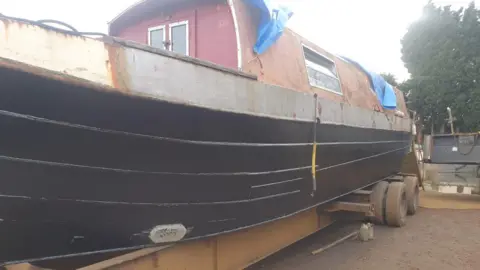 Forces Veterans Afloat
Forces Veterans AfloatAfter suffering from self-isolation Mr Saunders said being on the canal forced him to work and interact with people.
"This lifestyle is exactly what I need.
"My psychiatrist and psychotherapist cannot believe the amount of recovery I have gained by living this life.
"This life as a continuous cruiser on the canal network - I actually feel human again for the first time in eight years."
Ms Lane, who when not on the canals lives in Upton upon Severn, Worcestershire, said she was in the process of looking for a site for a permanent mooring and maintenance facility in Derbyshire, and hoped to have it confirmed by the end of the year.
Follow BBC Nottingham on Facebook, on X, or on Instagram. Send your story ideas to [email protected] or via WhatsApp on 0808 100 2210.
